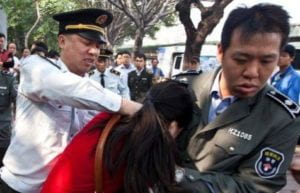The conflicts between “chengguan” and street vendors have erupted one after another, revealing a cruel reality: even when street stalls are banned in various places, many “chengguan” and street vendors still have not found a way to coexist harmoniously.
In the eyes of many city managers, street vendors are all the objects that need to be “eliminated”, rather than individuals who need to be “protected”. Conflicts are almost inevitable in the process of “law enforcement” between “chengguan” and street vendors. “Chengguan”‘s law enforcement has been criticized not only for its “bullying” image, but also because it ignores the actual needs of citizens.

When it comes to the conflict between “chengguan” and street vendors, people are used to considering street vendors as “weak” since this group of people are usually poor migrants whose life depends on the small street stall that they own. In fact, stripped of their professional identity, “chengguan” are just “weak” in real life, and on-the-spot law enforcement is just a way of working in exchange for survival. The problem is that there is a real contradiction between the two “weak” ways of living: if the “chengguan” are active in their duties, the street vendors cannot survive; If the street vendors occupy the road at will, it means that the “chengguan” are neglecting their duties.
I have seen an interview with a “chengguan,” he tole the reporter that he would allow the street vendors to set up their stalls after his work is done so that he would have no duty to execute his power to ask them to go away. When he was asked if he would buy food from the street stalls, surprisingly, his answer was no because he could not afford them. It is unbelievable that the individual who seems to hold power in their hand, was actually an even more vulnerable one.
Why “chengguan” are facing this kind of issue?
Firstly, there are some problems left from history. The earliest urban management team was established in 1997. Before the establishment of urban management, the departments like city image were in charge. Also, the supervision of the society in that period ability is weak, for instance, the actions they took were very rough, which makes hitting things is often seen on the streets. As a descendant of these departments, the way of law enforcement was old as well. After the strengthening of social supervision, lots of the departments were not willing to continue this tiring and dirty job, which caused the “chengguan” to take over all the negative aspects in city management.
Secondly, the law enforcement environment of “chengguan” is poor, and there is still no progress in developing the means of law enforcement up to now. “Chengguan” have no other means of law enforcement to restrain illegal traders, for instance, they can neither revoke their licenses like the industry and commerce department, nor have personal control like the police. In the process of imposing a fine, there is a great chance to encounter resistance and non-cooperation. This would led them into fight. What is more, during their work of law enforcement, the crowd would gather to see what is happening. The preconceived stereotypes of “chengguan” would hinder their proper work.
In conclusion, most “chengguan” are normal people who earn their living by maintaining the city image. People should not just simply consider them as the “strong” and “evil” ones.
Leave a Reply